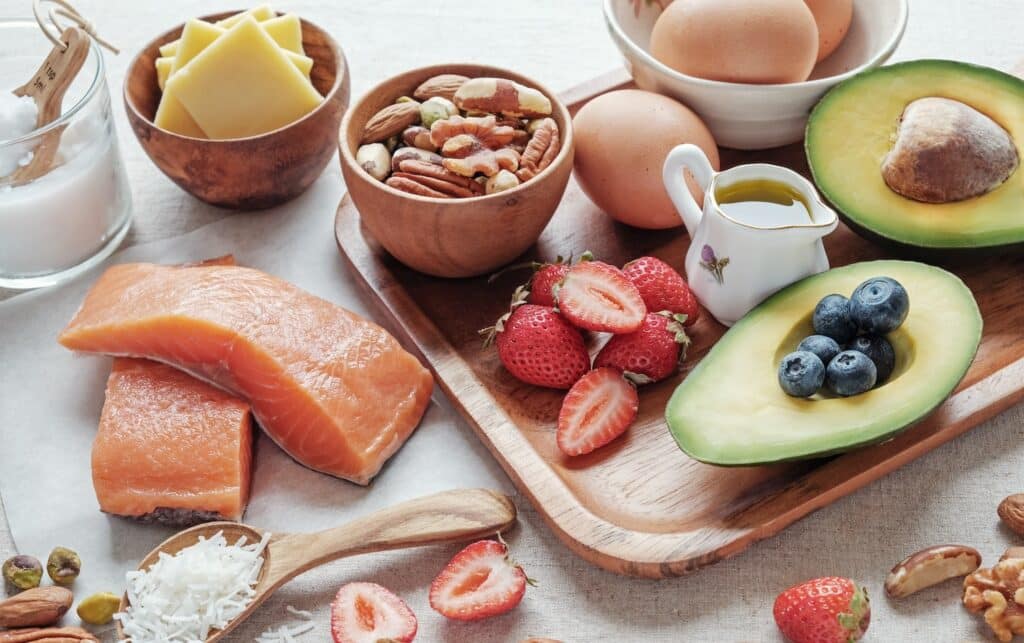Some of the Best Protein Powders Leave a comment
Choosing a protein powder can be overwhelming since there are so many options on store shelves. Ingredients, flavors, and protein sources can all factor into how you choose a protein powder.
When you go shopping for the perfect protein powder, start with some basic questions:
- What flavor do you like? The most effective protein powder is the one you’re happy to use. Look for flavors you enjoy so your daily protein shake won’t be a chore to drink.
- Do you have dietary restrictions? Check the ingredients of protein powders to make sure they meet your dietary choices. Labels should show if the product meets special requirements such as non-GMO, vegan, or kosher.
- Do you need to watch your sugar intake? If you’re keeping close tabs on how much sugar you eat each day, look for a protein powder formulation that contains an added sugar amount that works for you.
- Will it supply the right amount of protein? Take a look at the per-serving information to make sure the powder will give you the protein you want for your nutrition goals.
- Has it been tested for safety? Protein powders are considered supplements, not food products, so they aren’t regulated by the FDA.
Registered dietitian Joanna Gregg, RD, says, “It’s best to choose a protein powder that has been third party-tested. Third-party testing can help assure purity and safety of the product and validate that the ingredients on the label are actually in the product in the correct amounts.”
5 Protein Powder Types You Should Know
Most protein powders are made by extracting the protein from other food sources.
The extracted protein can be ground into a fine dust and combined with artificial flavors or sweeteners. You can add the end result to protein shakes, smoothies, cereal, milk, or water.
Nutrition labels will tell you about the amount of protein per scoop and additional ingredients.

1. Whey Protein Powders
How whey protein is made: Whey is the liquid left over after making cheese. Gregg explains, “The liquid from whey goes through a refining process to decrease the lactose and fat content, then refined into a powder that is pure protein.”
The benefits of whey protein: “Whey protein is sometimes considered to be one of the best protein supplements because it is a complete protein and contains all of the essential amino acids including the branched chain amino acids (BCAAs),” Gregg says. “The BCAAs are needed for muscle synthesis and recovery.”
Who whey protein is right for: Whey is technically a dairy product and appropriate for most people, but it’s not compatible with a vegan diet or if you have medical reasons to avoid dairy.
When to drink whey protein: Whey is an easily digested form of protein, so it’s a great choice for post-workout protein shakes.
Top whey protein powder recommendations:
Gregg’s #1 pick: Ascent Native Whey (Chocolate)
Runners up:
2. Casein Protein Powders
How casein protein is made: Casein is a component in milk that is responsible for emulsification. It can be extracted from milk and used in food products.
The benefits of casein protein: Casein-based powders are very filling, so it’s a good choice if you’re looking for a protein source to keep you full and help you avoid snacking.
Who casein protein is right for: Like whey, it’s a dairy product, so be sure to check labels. You shouldn’t pick casein protein powders if you need to stay away from dairy for any reason.
When to drink casein protein: Gregg notes that casein is a more slowly digested protein. “Try taking casein powder before bed or at other times when a sustained source of nutrients is the goal instead of immediate muscle repair or recovery,” she says.
Top casein protein powder recommendations:
Gregg’s #1 pick: Gold Standard 100% Casein (Chocolate Peanut Butter)
Runners Up:
Fun fact: Did you know MyFitnessPal has one of the world’s largest food databases, with over 19 million foods? Track your protein powders and more on the app!
3. Plant-Based Protein Powders
How plant-based protein is made: Plant-based protein powders can be made from soy, rice, hemp, and pea proteins.
The benefits of plant-based protein: “Most plant proteins are missing at least 1 of the 9 essential amino acids but they typically contain more fiber and antioxidants than whey-based proteins,” she says. “They are also environmentally friendly and lactose-free.”
Who plant-based protein is right for: Plant-based protein powders don’t contain animal products, so they may be more appealing to people who follow a vegan diet.
When to drink plant-based protein: Plant-based powders can be used to refuel after a workout or added to meals to increase protein content.
Top plant-based protein powder recommendations: Gregg’s #1 pick:
Runners up:
4. Egg-Based Protein Powders
How egg-based protein is made: Egg protein powders are made by dehydrating egg whites and refining them into powder.
The benefits of egg-based protein: Eggs are an excellent source of protein in their whole form. Experts agree that eggs are highly digestible and a source of essential amino acids. Eating eggs can also result in lasting satiety, which decreases your desire to snack later.
Who egg-based protein is right for: Egg-based proteins are good for people who don’t have egg allergies but might not want dairy proteins.
When to drink egg-based protein: Eggs are a classic breakfast food so egg-based proteins can be added to a breakfast smoothie.
Top egg-based protein powder recommendations:
Gregg’s #1 pick: Naked Egg (Unflavored)
Runners Up:
MRM Egg White Protein (Vanilla)
Source Nutrition Egg White Protein Powder (Chocolate)

5. Clear Protein Isolate Powders
How clear whey protein is made: Clear whey protein is a more refined type of whey protein. It consists of whey protein isolate that has been further processed, and is thought to contain less lactose, and be more water-soluble.
The benefits of clear whey protein: The powders for clear whey proteins are lighter in texture than traditional protein powders, so some online users describe them as being less heavy. “This is a fairly new product,” Gregg says. “There’s little research about its benefits versus other protein powders.”
Who clear whey protein is right for: These powders are appealing to people who want a lighter version of a whey protein drink.
When to drink clear whey protein: When you mix it with water, it’s more like a sports drink than a creamy shake, so it’s light and refreshing after a workout.
Top clear whey protein powder recommendations:
Gregg’s #1 pick: My Protein Clear Whey Isolate
Runners up:
Frequently Asked Questions
Is tracking protein intake important?
Tracking protein, along with carbohydrates and fats, can be useful for ensuring you’re eating a good balance of macronutrients, especially if you have specific weight goals.
Try tracking your macros for FREE with the MyFitnessPal app.
Can I rely on protein powder to hit all my protein needs?
Protein powders are an easy way to track protein intake since the serving information makes it clear how much protein you get with each scoop.
“Don’t let protein powders replace other sources of macronutrients,” says Gregg. “Powders are great but they’re meant to be dietary supplements, not substitutes for a varied diet. Lean meats, beans, eggs, and dairy are great sources of protein, too.”
How do I know how much daily protein I need?
As a general recommendation, you should be getting 10% to 35% of your daily calories from protein. Try the MyFitnessPal Macro Calculator to get a customized recommendation.

